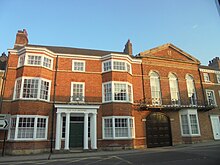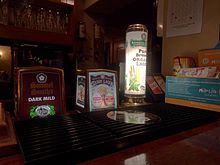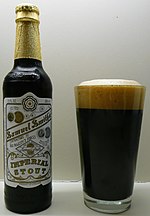
Beer is one of the oldest alcoholic drinks in the world, the most widely consumed, and the third most popular drink after water and tea. Beer is produced by the brewing and fermentation of starches from cereal grains—most commonly malted barley, although wheat, maize (corn), rice, and oats are also used. The fermentation of the starch sugars in the wort produces ethanol and carbonation in the beer. Most modern beer is brewed with hops, which add bitterness and other flavours and act as a natural preservative and stabilising agent. Other flavouring agents, such as gruit, herbs, or fruits, may be included or used instead of hops. In commercial brewing, natural carbonation is often replaced with forced carbonation.

Newcastle Brown Ale is a brown ale, originally brewed in Newcastle upon Tyne, England. Launched in 1927 by Colonel Jim Porter after three years of development, the 1960 merger of Newcastle Breweries with Scottish Brewers afforded the beer national distribution and sales peaked in the United Kingdom in the early 1970s. The beer underwent a resurgence in the late 1980s and early 1990s with student unions selling it. Brewing moved in 2005 from Newcastle to Dunston, Tyne and Wear, and in 2010 to Tadcaster. In 2017, the Heineken Brewery in Zoeterwoude, the Netherlands, also began production. As of 2019, it is brewed as well by Lagunitas Brewing Company in Petaluma, California, and Chicago, Illinois, for the American market.

John Smith's Brewery in Tadcaster, North Yorkshire, England, produces beers including John Smith's, the highest selling bitter in the United Kingdom since the mid-1990s.
The Boston Beer Company is an American brewery founded in 1984 by James "Jim" Koch and Rhonda Kallman. Boston Beer Company's first brand of beer was named Samuel Adams after Founding Father Samuel Adams, an American revolutionary patriot. Since its founding, Boston Beer has started several other brands, and in 2019 completed a merger with Dogfish Head Brewery.

Craft beer is a beer that has been made by craft breweries, which typically produce smaller amounts of beer, than larger "macro" breweries, and are often independently owned. Such breweries are generally perceived and marketed as emphasising enthusiasm, new flavours, and varied brewing techniques.

Brains is a regional brewery based in Cardiff, Wales. It was founded in 1882 by Samuel Arthur Brain. At its peak, the company controlled more than 250 pubs in South Wales, Mid Wales and the West Country but the brewer sold most of its pub estate in 2022. The company took over Crown Buckley Brewery in Llanelli in 1997 and Hancock's Brewery in 1999. In 2000, Brains moved to the former Hancock's Brewery just south of Cardiff Central railway station. The Old Brewery, in Cardiff city centre, has been developed into a modern bar and restaurant complex.
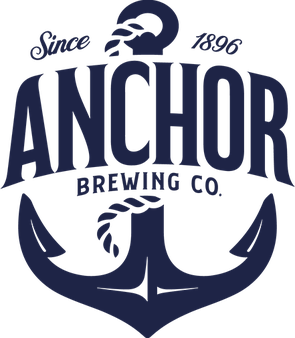
Anchor Brewing Company was a brewery on Potrero Hill in San Francisco, California. Founded in 1896, the brewery underwent several changes in location and ownership throughout its history. After years of declining sales due to competition with larger breweries, Anchor was purchased by Frederick Louis “Fritz” Maytag III in 1965, preventing its closure. The brewery operated at its Potrero Hill location from 1979 and was one of the last remaining producers of steam beer, a variety of beer trademarked by the company.
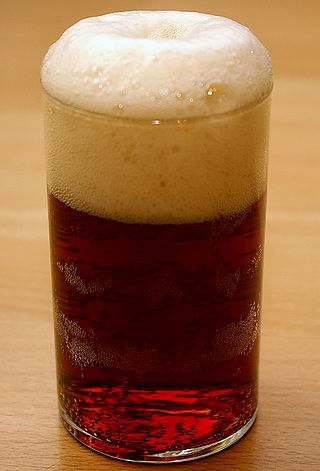
Altbier is a style of beer brewed in the Rhineland, especially around the city of Düsseldorf, Germany. It is a copper coloured beer whose name comes from it being top-fermented, an older method than the bottom fermentation of lagers.
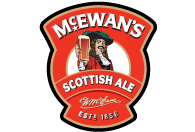
McEwan's is a brand of beer owned by Carlsberg Marston's Brewing Company. It was originally brewed by William McEwan's Fountain Brewery in Edinburgh, Scotland. The McEwan's brand passed to Heineken in 2008 after their purchase of Scottish & Newcastle's British operations. Heineken sold the brand to Wells & Young's in 2011, who sold their brewing operation, including the McEwan brand to Marston's in 2017. Cans and bottles are now brewed in Bedford, England.

Fuller's Brewery in Chiswick, west London, England, is the former brewing division of Fuller, Smith & Turner PLC. It was a family-run business from its foundation in 1845 until 2019, when it was sold to the Japanese international beverage giant Asahi.
Webster's Brewery was a brewery founded in 1838 by Samuel Webster which operated at the Fountain Head Brewery in Halifax, West Yorkshire, England. Webster's Green Label, a light mild, and Yorkshire Bitter gained national distribution after the company was taken over by Watney Mann in 1972. Throughout the 1970s it was known for the advertising slogan: "Drives out the northern thirst".

Beer has been brewed in England for thousands of years. As a beer brewing country, it is known for top fermented cask beer which finishes maturing in the cellar of the pub rather than at the brewery and is served with only natural carbonation.
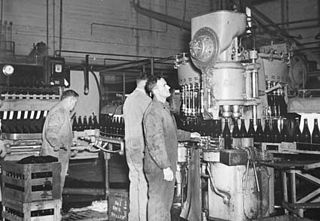
Beer arrived in Australia at the beginning of British colonisation. In 2004 Australia was ranked fourth internationally in per capita beer consumption, at around 110 litres per year; although, the nation ranked considerably lower in a World Health Organization report of alcohol consumption per capita of 12.2 litres. Lager is by far the most popular type of beer consumed in Australia.

Brewing in Ireland has a long history. Production currently stands at over 8 million hectolitres, and approximately half the alcohol consumed is beer.

Robinsons Brewery is a family-run, regional brewery, founded in 1849 at the Unicorn Inn, Stockport, Cheshire, England.

The Great Yorkshire Brewery is situated in the village of Cropton in North Yorkshire, England. Located within the North York Moors National Park, it is 2 miles north west of Pickering.

Stones Brewery was a brewery founded in 1868 by William Stones in Sheffield, West Riding of Yorkshire, England, and purchased by Bass Brewery in 1968. After its closure in 1999, its major brand, Stones Bitter, has continued to be produced by the Molson Coors Brewing Company.
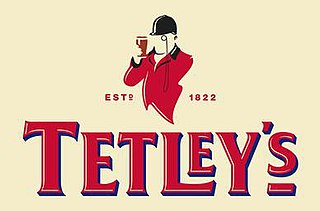
Tetley's Brewery(Joshua Tetley & Son Ltd) was an English regional brewery founded in 1822 by Joshua Tetley in Hunslet, now a suburb of Leeds, West Yorkshire. The beer was originally produced at the Leeds Brewery, which was later renamed the Leeds Tetley Brewery to avoid confusion with a microbrewery of the same name.

Camerons Brewery is an English brewery established by John William Cameron in Stranton, Hartlepool, County Durham, in 1865. It is the largest independent brewer in the North East of England, with a brewery capacity of 1.5 million hectolitres and a tied estate of 75 houses. It is one of the oldest industrial concerns in Hartlepool, and has historically been one of the largest employers.

